The Nature of Expertise
by John T. Reed

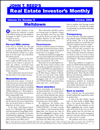
(This article first appeared in Real Estate Investor's Monthly.)
I am an expert on expertise. I have written over 4,000 nationally published how-to articles and 64 nationally-published how-to books including a book on how to write how-to books. The purpose of this newsletter is to impart expertise to readers.
Coach
I’ve also coached 35 athletic teams, which is a how-to exercise where you can see the progress or lack thereof as well as get tested by competition once or twice a week during the season.
Yet I sense in the questions and emails I get daily that few people understand the fundamental nature of the expertise they seek, including its limits.
Best practices
In the business world, they lately have adopted the phrase “best practices” to mean business expertise. It’s a good phrase that describes lessons that have been learned by businesspeople with regard to what works.
Scientific method
In the scientific world, they call it the results of the application of the scientific method. There is a good article about what that is and what it is not at http://www.freeinquiry.com/intro-to-sci.html.
My recollection of the scientific method from junior high school is that it consists of five steps:
- State the question.
- Research everything that has been written about what the answer is.
- Posit a hypothesis as to the answer.
- Test your hypothesis.
- Draw a conclusion based on the results of the experimental results.
The problem is the vast majority of people just do steps 1 and 3 before jumping to 5: drawing a conclusion. Their logic seems to be, “I’m so smart that my theory must be correct, so I don’t need to test whether it is.”
Learning
The venerable Bloom’s Taxonomy enumerated the different forms of learning:
- Knowledge—memorization of words, facts, and concepts
- Comprehension—understanding and articulating your learning
- Application—ability to use learning to solve a new problem
- Analysis—ability to break down into parts and understand connections
- Synthesis—transmutation of old info into valid new applications
- Evaluation—ability to judge new ideas based on past learning
Trying to memorize
Most investors in my experience are struggling with form Number 1: Knowledge. That is, they are trying to memorize real estate investment. I did the same when I first started. Real estate seemed an overwhelming mass of details and definitions to be memorized.
One of my West Point classmates and company mates was very smart and tutored a bunch of my other company mates in our academics there. He was famous for admonishing his tutorees, “Don’t spec it! Understand it.” “Spec” is a cadet slang word for memorize.
In fact, you have inadequate understanding if you memorize real estate or any other field.
Basic principles

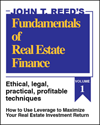
Now, I see real estate investment, football coaching, and the various other things in which I am an expert as a series of basic principles. All the seeming myriad details are just variations on a few simple principles.
For example, in my book Fundamentals of Real Estate Finance, I said that all real estate finance techniques are just different recipes using the same few ingredients. All lenders want to know three things:
- How much money will you pay me?
- When will you pay me that money?
- How sure is it that you will pay me?
Three Cs and payment patterns
The latter question is generally defined by what lenders call the Three Cs: character, capacity and collateral. The “how-much” and “when” questions are simply about payment patterns which are almost infinite in number as long as the lender ultimately gets back their principal and interest.
Similarly, I have written six books about football coaching. There, everything stems from two principles: the principle of offense is strength against weakness and the principle of defense is strength against strength.
Input X = Output Y
I define expertise very broadly as simply knowing specific inputs that produce certain outputs. That is, if you do X, Y will happen. For example, if you plant corn seed, corn plants will grow. That is expertise.
On the other hand, saying that if you buy real estate it will go up in value and you will make money is not expertise. It is something that sometimes happens, but sometimes doesn’t.
Whether it will happen in a given case depends on various factors beyond your control or ability to forecast. The fact that some say this result will occur, followed by its actually occurring, proves nothing. To believe otherwise is to fall prey to the post hoc ergo propter hoc (after which therefore because of which) logic fallacy.
Probability
Action X producing result Y rarely occurs 100% of the time. Expertise like knowing that raising the temperature of water to 212º F at sea level causes it to boil and turn to steam is an example of a 100% correlation bit of expertise. (correlation coefficient of -1 or +1 in technical terms)


Gambling
Gambling operations are at the other end of the probability spectrum. There, a mere 53% or so correlation produces a profit. In theory, a 50.1% would be enough, but it has to be about 53% to cover the overhead and such.
Minimum success probabilities required for different situations
So each type of expertise has a minimum probability required before the expertise in question is profitable. For example, a plastic surgeon must have a much higher correlation between his or her actions and the result than a general surgeon operating on emergency-room patients.
Since plastic surgery is to correct cosmetic, not health, problems, there must be a high probability of success in order for the patient to go ahead. On the other hand, in an emergency room, where the patient is in imminent danger of dying or suffering other severe consequences, there need only be a probability of good health that is greater than the probability of good health if the surgery is not performed to warrant proceeding.
Risk preference
That is sometimes characterized as a “risk preference” or “marginal utility” matter.
Risk preference says that we have preferences for certain risks over others such that we are not consistently logical. For example, virtually everyone would take a one-dollar bet that a roll of a die (singular of dice) would show a number higher than two because there is a probability of 4/6 or 67% that it would.
But few people would take that same bet if the amount wagered were their entire net worth—even though the probability is still the same. Star Trek’s Spock would dismiss the latter decision as “illogical.” The bettor would protest that he would not mind losing one dollar, but would very much mind losing his net worth.
Marginal Utility
Marginal utility relates to a similar place on the effect-on-your-life spectrum, but comes at it from the other direction.
In the current movie Pursuit of Happyness [sic], which is excellent and based on a true story, the hero managed to go from homeless to living in a hotel room when he sold a single $250 medical device. Later in his life, he became a millionaire. No doubt his acquiring, as a millionaire, an additional $250 would have virtually no effect on his life. That’s because the more money you have, the less useful additional amounts are.
Minimum probability needed is a function of the stakes
Accordingly, the minimum probability of an effect resulting from a cause would have to be quite high in the case when the stakes are quite high like betting your entire net worth. On the other hand, the probability of success when the stakes are just $250 for a millionaire could be down around 51% and the bettor would probably take the bet.
Varies by situation
So what constitutes valid expertise in some situations and for some people would not constitute valid expertise in another situation for another person. To claim that you have valid expertise, your success rate at causing desired effects must be high enough that a similarly situated, reasonable person, as opposed to a thrill seeker, would be willing to proceed with the gamble based on your recommendations as to how to proceed.
Lots of iterations
All reasonable persons should be willing to take the gamble when the number of iterations is high and the stakes per iteration are low.
For example, you would not be willing to bet your life savings that a die would show a number greater than two if the die were only to be rolled once, but if the bet were on whether it would show greater than two on average in 1,000 rolls, you should take the bet.
That means you can make money with a much lower level of expertise, approaching the 51% to 53% success rate level on even bets, if the activity in which you engage has a high number of iterations, each of which entails only a low-stakes bet.

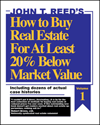
Asymmetrical
Sometimes the amount that you win or lose is not an even bet. Rather, it’s asymmetrical. The example I often cite is investing in real estate indirectly by buying judgments against persons who own real estate in your area. There is a chapter about that in Volume 2 of my book How to Buy Real Estate for at Least 20% Below Market Value.
In that approach, you buy small claims court judgments for about $400 to $500 each. If you buy the right one, you make about ten times your cost in profit. If you buy the wrong one, you lose all of your investment. The actual investor I wrote about said he was able to buy about one per day once he got going.
Wrong 9 of 10 times
With those numbers, you can buy the wrong one nine times and the right one once and still come out ahead. Since you do it 250 times a year with low-stakes bets, you can be confident that the average results will be stable, predictable, and profitable.
Arthur Conan Doyle’s fictional Sherlock Holmes once said, “As an individual, man is an unsolvable puzzle, but in the aggregate, he is entirely predictable.” That is, you cannot predict the outcome of one roll of the dice or the lifespan of a single person, but you can predict the outcome of a million rolls of the dice or the average date of death of a million people.
Now contrast that with the behavior of the typical real estate investor. He makes very few, relatively high-stakes bets on outcomes in which he cannot possibly have much expertise.
Expertise varies
The public tends to behave as if pertinent expertise were always available. The medical profession is a good place to show otherwise. The expertise to set a fractured bone is quite readily available and success rates are quite high.
But the expertise to cure metastasized cancer is quite low. It matters not how much you study or practice at this time. No one can, at present, achieve a satisfactory level of expertise in curing metastasized cancer.

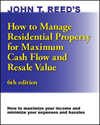
Screening? yes
Similarly, in real estate investment, you can relatively easily achieve a satisfactory level of success at screening prospective tenants. See my book How to Manage Residential Property for Maximum Cash Flow and Resale Value. But you cannot achieve any level of expertise whatsoever at predicting or controlling interest rates.
Conclusion: it’s OK to put yourself in a position where forecasting tenant success rates affects your income, but not where forecasting mortgage interest rates does. To put it another rough way, it’s OK to be a landlord if you have a 30-year, fixed-rate mortgage. Actually, there are more variables than that, but if there were only those two, the statement would be correct.
Talent expertise
Not all expertise is acquired. Much is congenital. In other words, many people can possess a level of expertise in a particular area that others have no hope of acquiring no matter how hard they try. Running speed is an example. You can improve at the margins with diet, exercise, and technique, but fast runners are born that way. And so are slow ones.
You must take care to avoid going into a field or an approach to real estate where you lack the talent expertise required to compete and succeed. People skills, negotiating, and so forth are talents that are very important in some aspects of real estate.
For example, to be a pre-foreclosure investor, you need great people skills to negotiate a favorable deal with the person being foreclosed upon, but you need zero people skills to buy the same property at the foreclosure auction.
Subtle expertise
Some expertise is super subtle, so much so that most people would never recognize its existence. For example, great generals have an ability to recognize that men die in battle and to make the necessary cold calculations to expend some lives to save others. That particular expertise may make the general in question a near useless human being in most other contexts.
Many real estate approaches require high toleration of rejection, a characteristic of successful salesmen. Again, you may not want to hang around with such people. You may even cross the street when you see one coming, but you should want to hire them for your sales force and, if you are one, it is a type of expertise you can capitalize on by pursuing certain real estate investment approaches.
Zen
The most subtle form of expertise of all is zen. The classic admonition in zen activities is, “Don’t make it happen. Let it happen.”
My book on baseball coaching talks much about the zen which governs pitching, throwing, hitting, and fielding grounders in the infield.
In most areas of life, the harder you try, the more you succeed, but in the zen areas, trying too hard results in failure. Sales and relations with the opposite sex are other examples of somewhat zen activities.
In real estate, it would pertain to negotiations. It also pertains to renovations and other problem solving.
Once, when I was in junior high school, I became so frustrated trying to solve an algebra problem that I was crying. I finally gave up and went to bed.
The next morning, while eating breakfast, I saw the text book open and was reminded of the problem which I instantly and easily solved just by glancing at it. Zen.
You are right to seek expertise pertinent to succeeding in real estate investment, but remember that there is no expertise to be had with regard to many important variables. Remember also that expertise is knowing the correlations between certain causes and effects and knowing how high that correlation has to be to produce a profit in given circumstances. Finally, some expertise is real and important to success, but it’s subtle and congenital, and not acquirable. JTR
PART II


In the 1/07 issue, I wrote an article called “The Nature of Expertise.” I am currently reading the book The Wisdom of Crowds by James Surowiecki. It has additional insights into true expertise.
Peer review
Professional journals are generally peer reviewed. That is, articles are reviewed by other experts in the same field before they are published. The article does not pass peer review unless the other experts agree that the facts and theories contained therein are correct.
Sometimes, when an article breaks new ground, peer review can be destructive for the wrong reasons. But generally, peer review is a good thing. It is based on the usually-correct principle that one test of expertise is whether other experts in the same field agree.
TV guru experts
I laugh at the idea of the TV infomercial real estate gurus being peer reviewed. They have such little real knowledge of real estate that I expect a standard real estate investment question submitted to a dozen of them, such that they could not consult each other, would elicit a dozen different answers most of which would be incorrect.
In contrast, a normal expertise question submitted to twelve doctors, lawyers, or engineers would get eleven or twelve virtually identical answers.
Less than 50% agreement
Surowiecki says that in such fields as stock picking, livestock judging, and clinical psychology, the rate of agreement between “experts” is below 50%. Obviously, those “experts” are charlatans, notwithstanding the fact that some are sincere.
Expert witness
Or consider a TV infomercial guru testifying in court as an expert witness. They must first establish to the judge that they are legitimate experts.
They would have to give their training and education in the field, recite their work experience, list the addresses of all the properties they ever owned, and list the peer-reviewed publications they had written. It might result in a legal first: an expert witness taking the Fifth.
Who wants to be a millionaire?
The Who Wants to be a Millionaire TV show lets its contestants consult either an expert friend or relative or the studio audience to help them answer questions. The expert friends or relatives were right 65% of the time; the audience of non-experts, 91%.
Group average better than best expert
One of the big points in the book is that, under certain circumstances, groups of people with varying pertinent expertise almost always out-perform the experts. In fact, the group generally gets a more accurate answer as the best individual in the group or an identical answer to the best person in the group.
No one can figure out why, but this fact has been established and re-established again and again in various areas. It does not apply to all questions or situations, but to many.
In an interesting turn of phrase, Cornell economist Maureen O’Hara said, “While markets appear to work in practice, we are not sure how they work in theory.”


Challenger diagnosis
One example Surowiecki gives is the stock market figuring out in an hour that Morton Thiokol, not Rockwell, Lockheed, or Martin Marietta was responsible for the Challenger space shuttle disaster. Thiokol’s stock fell and stayed down. The others fell slightly but quickly rose back up. A panel of experts concluded the same thing six months later.
Normally, the average performance in a group—like 100-yard dash times—is mediocre. But with regard to guessing things like the number of jelly beans in a jar, and many more important questions, the group average answer is probably the best possible answer.
Google searches, which are based on popularity of various Web sites and their links to other sites, are one of the most well-known examples of a group average beating the experts.
Overrated
On page 32, Surowiecki says, “...the value of expertise is, in many contexts, overrated. The fundamental truth about expertise is that it is…spectacularly narrow.”
Narrow
That is one of the points I was making in January. I am a real estate investment, football coaching, and baseball coaching expert. But that does not mean I know everything about each of those subjects. No one does. One reason is that some aspects of any field are unknowable. Others take enormous amounts of time and extensive study.
You, too
Remember I am not just talking about the expertise of those of us who call themselves experts. I am also talking about you. You say you are a real estate investor. That implies you know a whole lot about real estate investment. In fact, you probably know less than you think, that is, some of what you “know” is not true.
As the great philosopher Clint Eastwood once said, “A man’s got to know his limitations.” Overconfidence is the root of a great many failures including many in real estate investment.
Too broad a field
Some people claim or quietly think they are experts in fields so broad that no one is expert in them. Surowiecki lists such fields as “decision making,” “policy,” and “strategy.” I would add negotiating and “success” to that list. My current top-selling book is Succeeding, but that book is a list of specific lessons learned rather than the usual mystical rah rah one finds in virtually all the other such books.
In my last article, I said that no one has or could have expertise regarding future market prices or interest rates.
Dismal performance
Surowiecki points out, as I and others have, that many so-called experts have awful records. For example, about 90% of mutual-fund managers did less well than the Wilshire 5000 Index fund between 1984 and 1999—a period that included the dot.com boom. In other words, they did less well than persons who have no expertise whatsoever and who gave no thought at all to stock picking.
Such lousy performance is typical of almost all periods. By definition, mutual-fund managers claim they know best how to pick stocks. In fact, there is no evidence that any can.
Surowiecki cites one study that found that laypeople were better at predicting people’s behavior than certified psychologists. The Cho incident at Virginia Tech proved that.


Internal inconsistency
Sometimes, so-called experts come up with internally inconsistent findings. He cites one study that found that medical pathologists—the people who look at x-rays, specimen slides, EKGs—gave different opinions on the same evidence. For example, looking at an x-ray the first time they conclude, “That’s cancer,” then, later, when shown the same x-ray without being told it’s a re-run, they say, “That’s not cancer.” That happened half of the time.
That’s scary. It also indicates that such pathologists are charlatans. I believe that neural network computers have now reached the point where they can be shown pathology evidence exhibits one after another and the autopsy or biopsy results on that same exhibit and thereby learn how to recognize them.
Such computers have no hubris or trade association or lawyer to get indignant about their expertise. Indeed, they would be the perfect expert saying “I don’t know” in all cases where they could not find other than a 50-50 probability for two diagnoses and assigning a probability of correctness to all their other diagnoses.
Calibrating
The latter is called “calibrating,” that is, having a sense of how accurate your analysis is. Earlier, I cited doctors, lawyers, and engineer as examples of true experts. But they are not immune to overestimating their abilities.
A study by economist Terrance Odean found that doctors, nurses, lawyers, engineers, entrepreneurs, and investment bankers all believed they knew more than they really did. Another study found foreign-exchange traders overestimated how accurate their predictions were 70% of the time.
The only experts Surowiecki found who accurately estimated their expertise were top bridge players and weathermen. The latter is probably proof of the old saying “What you measure, you manage.” Baseball players are probably also pretty good at estimating how good they are because of the ubiquitous stats in that sport.
Not enough time
Another problem with figuring out who has expertise, including yourself, is lack of data. If you started investing five years ago, in a boom, you are likely to overestimate your abilities. In a bull market, everyone thinks he’s a genius.
But if you observe yourself or another to figure out if you or he or she is an expert, you have to do so for decades and many experiences. By the time you are ready to draw a conclusion, it may be too late or the world may have changed such that past performance is no longer indicative. In other words, although it may be possible to identify an expert over time, it may take so long that it’s not useful or the effort is not worth it.
Seer-suckers
The expertise that is probably in most demand—forecasting the future—is non-existent. But that does not stop people from pursuing it. Surowiecki calls the people who are trying to buy clairvoyance, seer-suckers as in they are suckers for those who claim to be seers.
Expertise in man-made facts
The area of expertise that is perhaps the most accurately depicted is memorization of rules. For example, the legal profession and its expertise consists for the most part of laws written by legislators, most of whom are lawyers, and judges, virtually all of whom are lawyers, and practicing lawyers who memorize or who can find quickly the words written by their fellow lawyers who are legislators and judges.

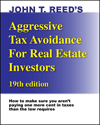
I have described what I do in my book Aggressive Tax Avoidance for Real Estate Investors book as translating the real-estate-related portion of the Internal Revenue Code and accompanying rules, regulations, and court decisions into plain English. My book Football Clock Management, to a large extent, examines the football rule books carefully to extract the clock-related rules which I then combine with logic, decision analysis, and actual case histories (analogous to court decisions) to create a set of rules for how to manage the clock in a football game.
I do not mean to diminish the memorization of rules and the ability to find such rules quickly as an expertise. In our complex world, there is a geometrically expanding list of rules that affect us. So we and everyone else need such expertise.
More importantly for my subscribers, learning the rules can enable you to take advantage of opportunities created by those rules. My article in last month’s issue on obtaining zoning changes is an example, as is my clock book. JTR